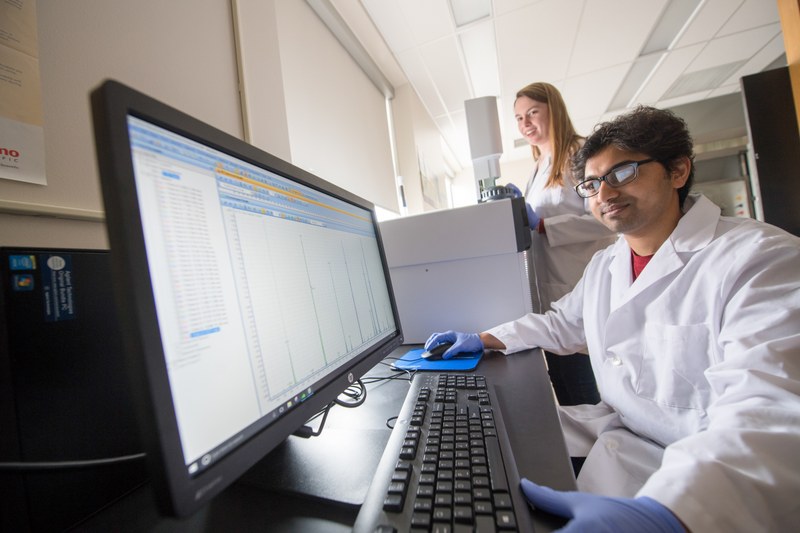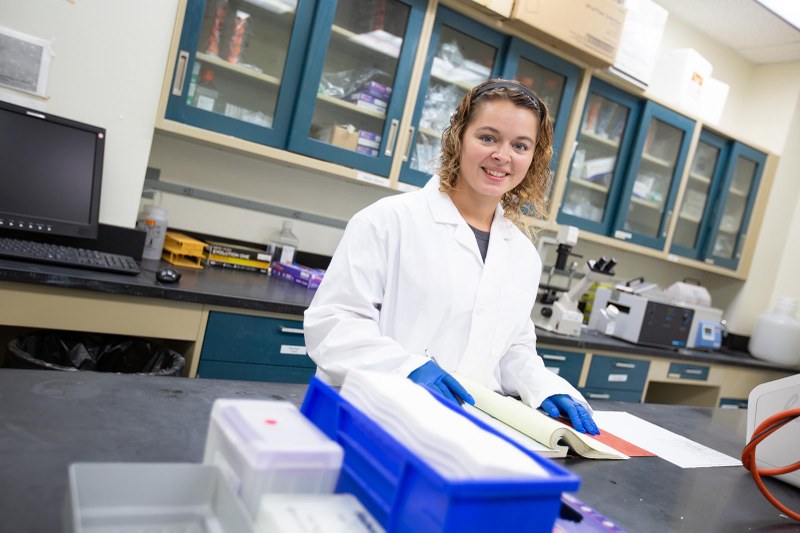Pharmacology and Toxicology Major
A roll-up-your-sleeves approach to biomedicine.
The Pharmacology and Toxicology Major is a scientific study of the effects different chemicals have on living cells. Grads make an immediate impact in the pharmaceutical and chemical industries, in government agencies, or continue on to advanced life sciences studies, medical, and other professional schools.
Passion for poison.
In Pharmacology and Toxicology, learning is not a spectator sport. Our faculty are conducting pioneering, life-saving undergraduate research, right now. They bring those lessons from the petri dish straight to the classroom. You get much more than a front-row seat—you have a role to play. Jump into the lab and assist with research. Discuss findings and shape the conversation.
Pharmacology and Toxicology is a unique way to look at health and medicine.
Our understanding of what makes living bodies tick comes from studying cells under stress from toxic substances. The ability to derive knowledge in the lab, on your own, and collaboratively in groups translates to extraordinary success in medical school and in the professional world.
Pharmacology and Toxicology is the right major if you:
- want to go to medical school or work in the pharma industry
- thrive in a focused, hands-on environment
- conducting research
- desire to make a difference in understanding and fighting diseases
See the University Bulletin for details on program requirements, suggested academic plan, and more.

Ag Journeys
“Conserving nature and fighting cancer are two big reasons I’m in Pharmacology and Toxicology.”
– Tricia Hojnowski

From the classroom to the four corners of the world.
Our renowned faculty insist that the syllabus is only a jumping off point for your education. We will help you find internships where you can bring your Pharmacology and Toxicology learnings to life. There are also faculty-guided, student-led clubs, hands-on research opportunities, and study abroad opportunities for just about any area of interest you can think of.
Craft your experience.
Related clubs and teams
- Mid-Atlantic Society of Toxicology
- Pre-Med Club
- See all clubs and teams
Recent internships
- Research assistant at pharmaceutical company
- Research assistant at national health organization
- Technical assistant at chemical company

A practical, workforce-ready degree—and a college experience you’ll love.
Penn State Pharmacology and Toxicology grads aren’t just in the top med, vet, dental, and pharmacy schools—they are excelling there. They’re also leading the workforce in biomedical companies worldwide. You can harness the awesome power of a truly unique education at one of the world’s most prestigious universities.
Our alumni out in the world
- Academic research and education
- Biomedical industry
- Government laboratories
- Graduate, medical, and professional schools
- Pharmaceutical industry
- Private research organizations
Pharmacology and Toxicology Career Options
What can I do with a Pharmacology and Toxicology degree? Here are just a few career examples:
Toxicologist
A toxicologist performs tests to identify chemicals present in the body.
What will I do?
- Use highly sophisticated instruments, chemical reagents, and precise methodologies to determine the presence or absence of specific substances
- Work with pharmaceutical companies to improve the safety of new drugs
- Work on cases involving environmental contamination to determine the impact of chemical spills
Biomedical researcher
A biomedical scientist works to gain knowledge on how the human body works and to find new ways to cure or treat diseases.
What will I do?
- Conduct lab research
- Develop and test new therapies
- Publish findings in medical journals
Pharmacist
Earning a Pharmacology and Toxicology degree can give you a jump start in pharmaceutical school.
What will I do?
- Dispense prescriptions to patients and offer expertise in the safe use of medicine
- Compound medications and prepare special solutions
- Provide immunizations
- Answer health-related questions—what foods, drinks, activities, or other drugs could have an effect on medication or what to do about a missed dose
Medical doctor
Pharmacology and Toxicology graduates may go onto medical school to become a doctor, a career focused on maintaining or restoring human health through the practice of medicine
What will I do?
- Pursue and practice specialties like surgery and pediatrics
- Diagnose and treat patients for all sorts of ailments and injuries
- Refer patients to specialists when needed for specific medical opinions and advice
Pharmacology and Toxicology students in the news
October 21, 2020
'Fungal Jungle' course continues to be hands-on learning despite virtual format
Students in “PPEM 120: The Fungal Jungle” are meeting virtually for class, but that hasn’t stopped their professors from ensuring that popular hands-on activities — such as growing oyster mushrooms or enjoying a fungal feast — didn’t fall by the wayside.
Read More


